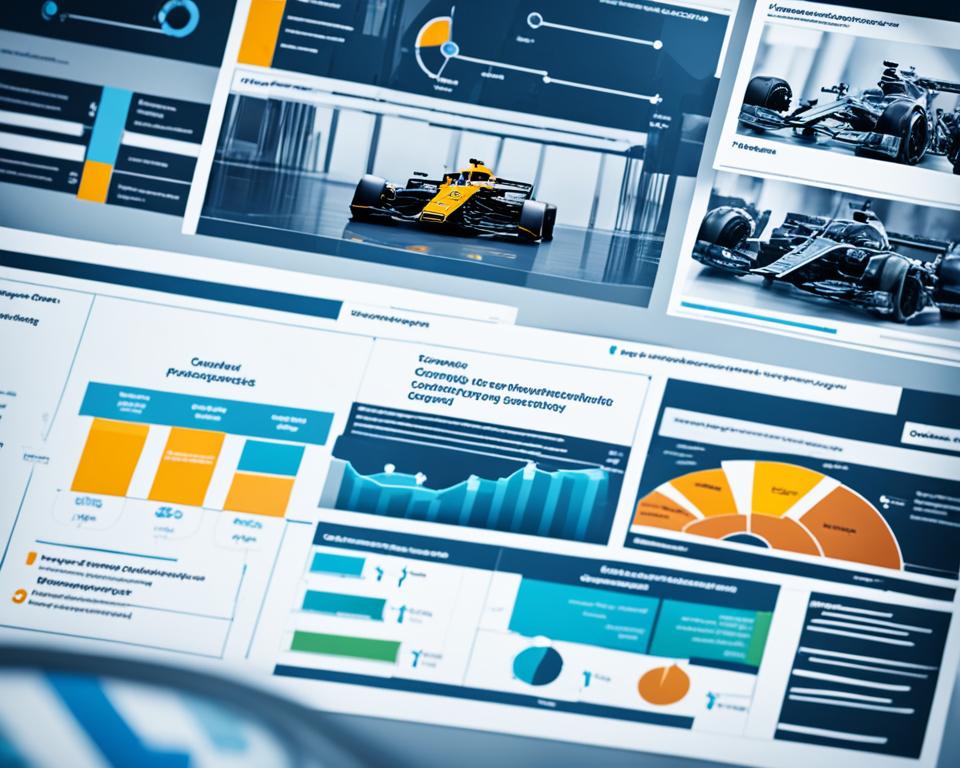Have you ever thought about why some businesses easily adapt to new trends while others lag behind? The answer often comes down to their use of technology, especially SAP IS. This software is more than just a tool; it’s a key player in changing how businesses work across different fields. By focusing on being flexible and quick to adapt, SAP IS boosts efficiency and keeps companies ahead in today’s fast-moving world.
Key Takeaways
- SAP IS provides specialized ERP solutions designed for diverse industry needs.
- Flexibility and responsiveness are central to enhancing business operations.
- SAP IS helps organizations remain competitive in a rapidly changing marketplace.
- The tailored approach of SAP IS supports improved efficiency across all sectors.
- Understanding SAP IS can transform traditional business practices.
Understanding SAP IS: A Brief Overview
SAP IS, or SAP Industry Solutions, is a set of software made for specific industries. It helps organizations in various sectors work better. These solutions are made to fit the unique needs of each industry, offering a high level of customization.
From my experience, SAP IS works well with other ERP systems. This makes it easier for companies to adapt to market changes. Using SAP Industry Solutions, businesses can greatly improve their operations to meet their needs.
To better understand the difference, I’ve made a table comparing traditional ERP Solutions with SAP Industry Solutions:
| Feature | Traditional ERP Solutions | SAP Industry Solutions |
|---|---|---|
| Customization | Limited, general features | Highly tailored to industry needs |
| Industry Focus | Broad, multi-industry | Specific to targeted industries |
| Integration | Basic integration capabilities | Seamless integration with ERP frameworks |
| User Experience | Standard user interface | User-friendly interfaces aligned with industry workflows |
| Scalability | Moderate scalability | Designed for growth in specific sectors |
In conclusion, SAP IS shows how important it is to tailor technology to fit different industries. By using these specific solutions, businesses can work better and grow sustainably.
The Importance of Industry-Specific Solutions in ERP
In the world of ERP, the importance of ERP is huge. Businesses do well with solutions made just for them, tackling their unique problems. Generic ERP systems often don’t cut it, causing waste and inefficiency. This shows why industry-specific solutions are key, made to fit the needs of different sectors.
Using niche market solutions, companies can make their workflows better, boost productivity, and do better overall. Think about a manufacturing company with complex supply chain issues. A basic ERP might not cover things like managing inventory and scheduling production. But an ERP made for the industry has the right tools for these tasks.
Knowing how different sectors work helps make ERP systems that really add value. Going for industry-specific solutions helps companies stay flexible and strong in a fast-changing market. For more on this shift in ERP, I suggest looking into this detailed article on SAP and ABAP Enterprise Solutions.

| Industry | Generic ERP Limitations | Industry-Specific Solution Benefits |
|---|---|---|
| Manufacturing | Ignores complex supply chains | Optimized inventory and production planning |
| Healthcare | Lacks compliance features | Adheres to regulatory standards and improves patient care |
| Retail | Fails to manage real-time data | Enhances customer experience and stock management |
How SAP IS Enhances Business Efficiency
SAP IS offers a strong way to make businesses run better by automating important tasks and making things smoother. It brings together specific features for different industries. This lets companies move faster and work more effectively.
Using SAP IS helps cut down on downtime. It spots and fixes problems quickly, stopping them from getting worse. This means businesses can work better and lose less time.
SAP IS also helps use resources better with smart analytics. Companies can make smart choices about things like stock, staff, and money. This makes things run smoother and helps grow the business by using resources well.
Also, SAP IS makes it easier for different departments to work together. It gives everyone the same information, helping teams work better together. This keeps projects on track and helps meet goals.
Lastly, SAP IS uses automation to cut down on manual work. This lets staff focus on creative tasks that make customers happy. Using these tools is a big step towards making a business run better.
Key Features of SAP Industry Solutions
The Key Features of SAP IS focus on giving businesses what they need across different sectors. A big part of this is customizable dashboards. These let users see important metrics and KPIs specific to their work. They make it easy to get to data fast, helping with quick decisions.
Also, industry-specific analytics help companies understand their performance better. This leads to strategies that help them grow. Real-time reporting is another key part of Specialized Business Software. It lets businesses react fast to new situations and market needs.
Tools like advanced forecasting and automated reporting make things run smoother. I’ve seen many companies get better at what they do and plan better. For example, many Indian companies have improved how they work with suppliers. They’ve become more open and collaborative thanks to these tools. To see more about this, check out this link.

SAP IS: A Comprehensive Approach to Vertical-Specific Software
SAP IS is a forward-thinking way to make software for different industries. It uses Comprehensive ERP Solutions to make operations more efficient. This means the software fits the needs of each industry, helping businesses do well.
SAP IS focuses on what each industry needs. This leads to better management and teamwork. Here are some key points about this approach:
- Tailored Functionalities: Each solution has tools made just for its industry, making it easier to use and work better.
- Improved Data Management: ERP Solutions help combine data from different departments. This leads to better decisions.
- Compliance and Standards: SAP IS makes sure businesses follow industry rules, reducing the risk of breaking them.
- Scalability: As companies grow, this software can too. It keeps up with changing market needs.
Benefits of Implementing SAP IS for My Business
Using SAP Industry Solutions (IS) can change how my business works. It brings big ERP Business Benefits. One key benefit of SAP IS is saving money by making processes smoother. Automating tasks cuts down on mistakes and boosts productivity. This lets my team do more important work.
Another big plus is doing things more efficiently. With SAP IS, I can use real-time data to make better choices. This helps me use resources better, which makes my business more competitive in today’s market.
Following rules and laws is important for businesses. SAP Industry Solutions help me follow these rules, reducing legal risks. This control builds trust with everyone outside and inside the company.
Handling customer service gets better with SAP IS. I can see all customer interactions clearly. This lets me offer services that really meet what customers need, making them happier and more loyal.

In short, SAP IS offers many benefits. It helps save money, work better, follow rules, and improve customer service. These benefits are key for growing a business in a lasting way. Making smart choices now helps my business thrive in the future.
| Benefit | Description |
|---|---|
| Cost Savings | Reduces manual errors and improves productivity through automation. |
| Operational Efficiency | Enhances decision-making with real-time data analytics. |
| Compliance | Ensures adherence to industry standards, minimizing legal risks. |
| Customer Service | Offers a complete view of interactions for tailored services. |
Industry-Tailored Applications: Customization for Diverse Sectors
In the world of business, Customization in ERP is key. It lets companies adjust their systems to fit their specific needs. This ensures they can meet the unique demands of their markets well.
Every sector, like manufacturing, healthcare, or finance, has its own set of processes and challenges. Domain-Specific Applications are perfect for this. With SAP IS, companies can change their workflows, reports, and modules to fit their needs. This makes users more powerful, leading to better service and happier customers.
Companies can make their SAP solutions fit their industry standards with customizations. Here are some ways to do this:
- Identifying key performance indicators relevant to the specific industry.
- Integrating third-party tools that cater to niche market needs.
- Conducting training programs focused on unique operational workflows.
- Regularly updating systems based on industry innovations and feedback.
These steps boost operational efficiency and keep businesses competitive. As industries change, being able to customize and adapt is crucial. It helps companies grow and stay ahead in the market.
Real-World Success Stories: Transforming Industries with SAP IS
Many companies show how SAP IS changes the game. Their stories prove the power of ERP solutions in making businesses better and getting real results.
A big manufacturing company was struggling with slow procurement. They used SAP Ariba to fix this. Now, their supply chain is smoother, they work better with suppliers, and they spend less. Moving to cloud-based sourcing made things even better, as seen in smart procurement decisions.
In healthcare, a big organization used SAP IS to manage complex tasks. This led to better patient care and lower costs. As more sectors use these ERP Success Cases, the benefits grow. They get better data analysis and work smoother with their systems.
| Industry | Company | Results Achieved |
|---|---|---|
| Manufacturing | Leading Manufacturer | Improved procurement efficiency and supplier relationships |
| Healthcare | Major Hospital Network | Enhanced patient care and reduced operational costs |
| Retail | Global Retailer | Optimized inventory management and decreased overhead |
| Logistics | International Shipping Company | Streamlined operations and improved delivery timelines |
These stories show how SAP IS is changing industries. It leads to better performance and a competitive edge. Each ERP Success Case offers insights into how tailored ERP solutions can transform different sectors.
The Role of Sector-Focused ERP in Business Growth
Sector-Focused ERP, like SAP IS, boosts ERP Business Growth across different industries. These systems help companies match their operations with their industry’s needs. They make it easier for businesses to innovate and improve processes specific to their market.
Switching to an Industry Growth Strategy helps companies connect better with customers and grow their market. The main benefits of using Sector-Focused ERP are:
- Enhanced Operational Efficiency: Tailored workflows improve productivity by reducing redundant processes.
- Improved Data Insights: Sector-specific analytics provide actionable insights, allowing for informed decision-making.
- Greater Compliance Management: Adhering to industry regulations becomes seamless with specialized ERP features.
- Scalability: These systems easily adapt to evolving industry trends and company growth.
When businesses use Sector-Focused ERP, they get ready to grab growth chances better. Combining specific solutions with a strategic market approach leads to lasting success and a competitive edge.
How Specialized Business Software Streamlines Operations
In today’s fast-paced business world, using Specialized Business Software is key for companies wanting to work better. Solutions like SAP IS help get rid of unnecessary steps and make work flow better in different departments.
This software makes things work together better. It gives teams access to real-time data and helps them work together. This makes making important decisions quicker and more informed, which boosts productivity.

Using Specialized Business Software also helps manage resources better. It automates simple tasks, giving employees more time for important projects. This makes my team happier and more creative, leading to new ideas.
Trying to make operations smoother with ERP can cut costs and make a business more flexible and quick to adapt. In my experience, investing in this software has really helped my company grow and improve.
Breaking Down Domain-Specific ERP Systems: What to Expect
Using Domain-Specific ERP Systems can change how businesses work. These systems, like SAP IS, meet the special needs of certain industries. They go beyond usual ERP expectations in many areas. It’s key to know what to expect when you switch to such a system.
The time it takes to deploy these systems depends on how complex your operations are and what features you want. Most businesses take three to six months for a full setup. This includes checking things out, making the software fit your needs, and training everyone. Each step is important to make sure the software works well with your business.
Switching to Industry-Centric Solutions can really improve how things work. Many people find they work more efficiently because the software is made for their specific needs. Having access to real-time data helps make better decisions. These systems also make it easier to talk and work together within the company.
Support is also important after you start using the system. Most companies offer a lot of help and have customer service people ready to solve problems. This support helps users feel secure and use the system to its fullest.
In short, when you bring in Domain-Specific ERP Systems, get ready for a smooth change. You’ll see better user satisfaction and strong support. For more on how to make procurement better with integration, check out this in-depth look.
Implementing SAP IS: Best Practices for Success
Implementing SAP IS needs a strategic plan. Start with project planning. This sets the stage by setting goals, timelines, and who will do what.
Talking to stakeholders is key. It makes sure everyone’s ideas are heard. This helps get everyone on board and boosts Implementation Success. Also, having clear ways to talk helps solve problems during the process.
Training users is very important. It makes sure they know how to use the new system well. A good training program helps use the software right and gets the most out of ERP Implementation. Keeping up with support and updates is also crucial to meet new needs and use SAP’s new features.

- Project Planning
- Stakeholder Engagement
- User Training
- Ongoing Maintenance
These steps together make a solid plan for using SAP IS. For more on improving SAP coding, check out ABAP Object-Oriented Programming. This can help make SAP IS implementation better by leading to more organized and efficient coding.
Common Challenges and Solutions When Using SAP Industry Solutions
Using SAP Industry Solutions can bring big benefits, but companies often face challenges with SAP IS. These issues can slow down success. I’ve found several common problems and solutions for ERP issues during implementation and use.
One big challenge is getting users to accept change. Employees might like their old systems and don’t want to switch. This can make the switch slower. To fix this, I suggest letting team members help decide on the new software. Showing them how the new system will help and giving them good training can make a big difference.
Another issue is integrating data. Many companies find it hard to bring together data from different sources. This is key for a smooth move. A good plan is needed; using middleware can help with this. Also, making sure data is clean and uniform before starting can reduce problems.
Customizing SAP IS can be tough, especially if it doesn’t fit your business perfectly. Making SAP IS work with your company’s needs can be hard. I recommend working with consultants who know how to adjust SAP for your business.
Below is a table that outlines these common challenges and their corresponding solutions for clarity:
| Challenge | Solution |
|---|---|
| User Resistance | Involve users in the decision process and provide comprehensive training. |
| Data Integration Issues | Utilize middleware for data consolidation and standardization. |
| Customization Hurdles | Hire experienced consultants for tailored solutions. |
By tackling these main challenges with smart strategies, companies can make their SAP implementation smoother. This way, they can get the most out of their SAP industry solutions.
Future Trends in SAP IS and Industry-Centric ERP Platforms
The future of SAP IS is changing fast, thanks to new technology. Companies want to stay ahead, so they’re looking at new ERP trends. These trends include using artificial intelligence (AI) to make smarter choices, automate simple tasks, and improve how they work with suppliers.
AI and advanced analytics are key to this change. They make data clearer and help make better buying decisions. This helps companies handle complex procurement tasks well and work more efficiently. It shows how industry-centric ERP platforms are now designed for specific industries.
Cloud computing is also changing SAP IS. Moving ERP to the cloud makes it easier to scale and access data in real-time. This lets companies quickly adapt to market changes. It’s making enterprise resource planning more dynamic and setting up companies for success.
SAP Ariba modules are showing how the industry is evolving. With tools like Ariba Procurement Solutions, companies can make their buying process smoother. They can better manage suppliers and save money. This shows how modern ERP solutions can change business for the better.
Integrating SAP IS with Existing Business Processes
Integrating SAP IS with current business processes needs a detailed plan. This plan ensures everything works well together. It’s key for making things run better and reducing problems during the change.
Understanding ERP Business Processes is vital for a smooth integration.
Successful integration depends on several important factors:
- Thorough Assessment: Do a deep check of current business processes. Look at what’s working well and what’s not. This helps find the best way to add SAP IS.
- Stakeholder Engagement: Get people from different departments involved early. Hearing from various viewpoints helps make the integration fit everyone’s needs.
- Data Mapping: Know how data moves in current systems. A clear plan for data ensures important info is kept safe and moved right to SAP IS.
- Training and Support: Offer detailed training for employees. Getting them ready for the new system helps them adjust faster and work better.
- Gradual Rollout: Start adding SAP IS step by step. This lets you check and improve each step, fixing problems early.
Using SAP IS to improve ERP Business Processes can make things more efficient and productive. Focusing on Business Integration Solutions makes the switch smoother. This lets companies use their full potential.
Conclusion
SAP Industry Solutions are key to modern business success. We’ve seen how they boost efficiency and meet specific business needs. These solutions help companies stay ahead in a fast-changing market.
Looking ahead, SAP Industry Solutions will keep getting better. The success stories show how ERP solutions bring big benefits. This marks the start of a new chapter for businesses aiming to improve and grow.
By using these industry-focused tools, companies can tackle tough challenges and fully use technology’s power. This isn’t just the end of our SAP IS talk; it’s a call to see the bright future ahead. With ERP’s many benefits, businesses are set for success.
FAQ
What are SAP Industry Solutions (SAP IS)?
SAP Industry Solutions (SAP IS) are special ERP solutions for different industries. They help businesses work better and more efficiently.
How do SAP IS integrate with existing ERP systems?
SAP IS blends well with bigger ERP systems. It makes them work better and more flexible for each industry’s needs. This helps businesses use their resources well and run smoother.
Why are niche market solutions important in ERP?
ERP niche market solutions are key because they solve the unique problems of certain sectors. They help businesses work better and more effectively.
What key features can I expect from SAP IS?
SAP IS has cool features like custom dashboards and industry analytics. It also offers real-time reports and special tools for business. These help with making smart decisions and improving processes.
What benefits does implementing SAP IS provide my business?
Using SAP IS brings many benefits. It can save money, make things run smoother, help with rules, and improve customer service. These benefits help businesses grow and last longer.
How does SAP IS support industry-tailored applications?
SAP IS lets businesses customize their use to fit their needs. This makes services better and customers happier.
Can you share any success stories of businesses using SAP IS?
Yes, many companies have done well with SAP IS. They’ve changed their operations and seen big improvements. These stories show how ERP solutions tailored for industries can really help.
How does sector-focused ERP enhance business growth?
Sector-focused ERP like SAP IS boosts growth by encouraging innovation and better customer connections. It also opens up new market chances. This helps businesses stay ahead.
What challenges might I face with SAP IS?
Using SAP IS might bring challenges like getting users to accept it, integrating it with other systems, and making it fit your needs. But, there are ways to overcome these issues for a successful use.
What future trends should I look for in SAP IS?
Look out for trends like AI, advanced analytics, and cloud computing in SAP IS. These are changing ERP platforms to help businesses in various sectors.
How can I effectively integrate SAP IS with my existing processes?
To blend SAP IS well, make sure it fits with your current business and systems. This makes things run smoother and reduces trouble during the change.


